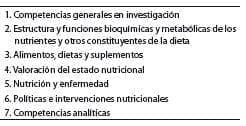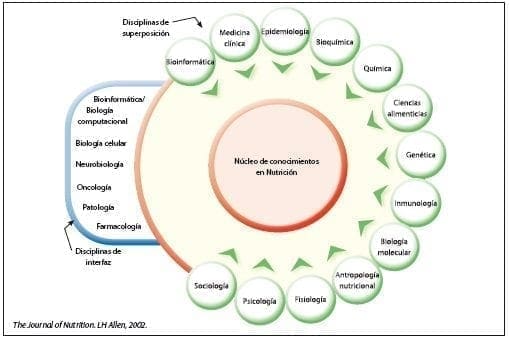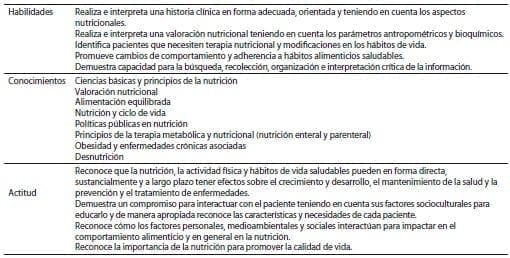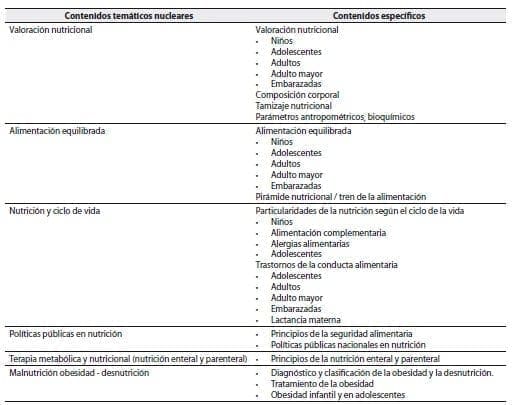Nutrition at the Colombian School of Medicine
The Medicine program at the Colombian School of Medicine (ECM) trains a general, professional doctor , ethical and human, with solid scientific and technological knowledge, with a critical and investigative attitude, capable of understanding and solving the main health and disease problems of the Colombian population, from a comprehensive vision of life contemplating its biological, psychological, and social aspects. and cultural.
To develop this occupational profile of the graduated doctor, the student has developed, among others, the ability to recognize the multiple dimensions of human life to act in the promotion of health and in the prevention, treatment and rehabilitation of the disease;the clinical competence to recognize and address the problems of the Colombian population, mainly those with the highest incidence and prevalence.
The profile of the graduate is based on specific competencies such as medical knowledge, skills clinical and communication skills.
These competencies are the translation of some learning objectives of the Colombian School of Medicine (ECM) that are aligned with the learning objectives of the University.
Since its beginnings, in 1977, the ECM has developed the biopsychosocial approach to health and illness, which aims to address the individual from his biological, psychological and social integrality.For this reason, the ECM is organized into three areas: 1. Bioclinical, 2. Psychosocial, 3. Community, in which the academic curricular activities of the Faculty are distributed.
In terms of academic credits, During the 6 years of medical training, 291 are taught, distributed as follows: 70% in the bioclinical area, 20% community and 10% psychosocial (table 1).
Table 1. Academic credits.

Until 2009 the Colombian School of Medicine (ECM) had a dietitian nutritionist professor who taught approximately 10 hours of nutrition in the second semester.
In 2011, the teaching group was expanded to two nutritionists, a doctor and a pediatrician, specialists in nutrition, who teach a total of 90 hours of face-to-face classes from the third to the twelfth semester.
These hours were integrated into the existing subjects where nutrition content is relevant: in the preclinical semesters, from III to VI , was integrated into the subject Primary Health Care and in the clinical semesters VII to of nutrition in the curriculum
As a science, nutrition is dedicated to the study of the processes by which living organisms use food to maintain life, growth, normal functioning of organs and tissues as well as energy production.
For its part, according to CH Halsted, clinical nutrition is defined as “the application of nutrition to diagnosis and treatment of diseases that affect the ingestion, absorption and metabolism of dietary constituents, and the promotion of health through the prevention of diet-related diseases.”(35)
Nutritional therapy or support is part of clinical nutrition since it is fundamentally dedicated to the diagnosis and prevention of malnutrition and the appropriate use of hospital artificial nutrition.(36) A complementary definition by CF Jonkers:( 37) “nutritional therapy is nutrition for hospitalized patients suffering from metabolic stress.”
According to the European Society of Clinical Nutrition and Metabolism, Nutritional Support includes food fortification, oral food supplements, enteral nutrition and parenteral nutrition.(38)
Nutrition is considered a basic science that integrates other sciences:
To which an approach from interdisciplinarity.However, the difficulty in defining and delimiting the knowledge of nutrition represents one of the main obstacles to the development and practice of this science.
This is how the American Society of Nutrition Sciences Nutrition in 2002 defined a central core of knowledge, with the aim of ensuring the future of this science (table 2).
Table 2. Central core of knowledge for the discipline of nutrition.(41)

This core gives academic uniqueness and homogenizes knowledge among nutrition specialists.(41) The central core of knowledge interacts with other interface sciences, which represent new frontiers of knowledge (figure 1).
 Figure 1. Curriculum content in nutrition is based on the recommendations of the Committee on Nutrition Education of the American Society for Nutritional Sciences.
Figure 1. Curriculum content in nutrition is based on the recommendations of the Committee on Nutrition Education of the American Society for Nutritional Sciences.
Genomics is In that sense, an innovative and promising frontier to position nutrition science as a fundamental science to understand life.Therefore, competencies in nutrition will be increasingly valued compared to the need to translate molecular events into clinical ones.
Competencies in nutrition
Taking into account the desired profile of the ECM graduate, the national problems in nutrition, and the health system that the doctor faces, the following competencies have been determined specific competencies (table 3).
Table 3. Specific competencies.

The competencies in basic sciences that pertain to nutrition or that are considered a requirement to address the topic of nutrition, are taught scattered from I to VI semester in the bioclinical subjects, mainly in biochemistry and physiology.
These unquantified hours are not taken into account in the 90 hours of the nutrition topic.
To develop these competencies, the following thematic contents have been included (table 4).
Table 4. Thematic contents in nutrition of the ECM curriculum.

Difficulties and opportunities for improvement in the integration of nutrition in the curriculum of the Colombian School of Medicine (ECM)
At least two have been identified difficulties in integrating the topic of nutrition into the medical curriculum of the Colombian School of Medicine (ECM).
On the one hand, the topic of nutrition has not been implemented as an independent subject , but has been integrated into various existing subjects, although all of them are mandatory.
This is due to the difficulty of making modifications to an overloaded curriculum and the need to implement other new topics also considered of paramount importance for doctors.
On the other hand, the difficulty in integrating theory and practice.The preclinical semesters where the practice is carried out in primary care, the topics covered in the subject are rarely applied.
In the clinical semesters, the theoretical hours are scarce and the correlation that can be made in the Practice depends on the hospital of rotation.
For the most part, teachers in these hospitals do not address nutrition, due to lack of knowledge, therefore, students are not trained on the subject.Duperly and collaborators have been carrying out various studies in 24 medical schools in the country, which aim to identify optimal strategies to improve education in healthy lifestyles and attitudes towards preventive counseling in addition to promoting strategies to improve the healthy lifestyles of the same students to achieve coherence between their habits and the counseling they will give to their patients.
Another opportunity for improvement has been identified in the thematic contents in the clinical semesters.Core topics by specialty must be clearly defined, taught and integrated into clinical practice.
Recommendations
Recognition of the relevance of the topic of nutrition in medical teaching is of fundamental importance for its development within the faculties.
Given this first step, opportunities for the implementation of some minimums must be identified fundamental curricular contents.
The creation of an independent and compulsory subject is considered the best strategy.The minimum contents that must be integrated should be the subject of a national consensus of experts.
Finally, the incorporation of at least one expert doctor or nutrition specialist in medical schools is a key aspect both for its development and to ensure the permanence of the topic of nutrition education.(43)
Conflict of interest
The authors declare absence conflict of interest in the preparation and publication of the article.
Bibliographical references
- 1.Colombian Institute of Family Welfare.National Survey of the Nutritional Situation in Colombia.Available at: www.Icbf.gov.co/ ENSIN 2010.
- 2.Correia MI, Campos AC, ELAN Cooperative Study.Prevalence of hospital malnutrition in Latin America: the multicenter ELAN study.Nutrition.2003;19(10): 823-5.
- 3.Giraldo N, Múnera N, Marrugo V, Piñeres L. Prevalence of malnutrition and evaluation of dietary prescription in adult patients hospitalized in a highly complex public institution.Perspectives in Human Nutrition.2007;9(1): 37-47.
- 4.Beloved MP, Pinzón OL.Prevalence of nutritional risk in a University Hospital in Bogotá, Colombia.RMNC.2010;1(1): 22-6.
- 5.Cárdenas D. The role of the doctor in Nutritional Therapy.In: Arenas, Anaya.Mc Graw Hill 2011. In press.
- 6.Chamberlain VM, Mays MH, Cummings MN.Competencies in nutrition that US medical students should acquire.Acad Med. 1989;64: 95-8.
- 7.Salas-Salvadó J, García-Lorda P, Bonada-Sanjaume A. Teaching nutrition in medical schools.Clinical Nutrition.1999;373(6): 24-36.
- 8.Lo C. Integrating nutrition as a theme throughout the medical school curriculum.Am J Clin Nutr.2000;72(suppl): S882-S9.
- 9.Kushner R. Barriers to providing nutrition counseling by physicians: a survey of primary care practitioners.Prev Med. 1995;24: 546-52.
- 10.Bistrian BR, Blackburn GL, Vitale J, Cochran D, Naylor J. Prevalence of malnutrition in general medical patients.JAMA.1976;235: 1567-70.
- 11.Galuska D, Will J, Serdula M, Ford E. Are health care professionals advising obese patients to lose weight?JAMA.1999;282: 1576-8.
- 12.Kushner R. Barriers to providing nutrition counseling by physicians: a survey of primary care practitioners.Prev Med. 1995;24: 546-52.
- 13.Levine BS, Wigren MM, Chapman DS, et al.A National survey of attitudes and practices of primary-care physicians relating to nutrition: strategies for enhancing the use of clinical nutrition in medical practice.Am J Clin Nutr.1993;57: 115-9.
- 14.Soltesz KS, Price JH, Johnson LW, et al.Family physician’s views of the preventive service task force recommendations regarding nutritional counseling.nineteen ninety five;4: 589-93.
- 15.Cimino JA.Why can’t we educate doctors to practice preventive medicine?Prev Med. 1996;25: 63-5.
- 16.Cárdenas D. Evaluation of knowledge and attitudes in nutrition of undergraduate and graduate students of the Faculty of Medicine of the Universidad El Bosque.RMNC.2010;2(1): 4-7.
- 17.Flynn M, Sciamanna C, Vigilante K. Inadequate physician knowledge of the effects of diet on blood lipids and lipoproteins.Nutr J. 2003;2: 19.
- 18.Ramman M, Violato C, Coderre S. How much do gastroenterology fellows know about nutrition?J Clin Gastroenterol.2009;43: 559-64.
- 19.Temple NJ.Survey of Nutrition Knowledge of Canadian Physicians.J Am Cabbage Nut.1999;18(1): 26-9.
- 20.Goiburu-Bianco ME et al.Level of training in nutrition of intensive care physicians.Survey in public hospitals in Asunción.Nutr Hosp.2005;20(5): 326-30.
- 21.Kirby R, Chauncey K, Jones B. The effectiveness of a nutrition education program for family practice residents conducted by a family practice resident-dietitian.Family Med. 1995;73: 246-25.
- 22.Young EA, Weser E, McBride HM, et al.Development of core competencies in clinical.Am J Clin Nutr.1983;38: 800-8.
- 23.Weinsier RL, Boker JR, Brooks CM, et al.Priorities for nutrition content in a medical school curriculum: a national consensus of medical educators.Am J Clin Nutr.1989;50: 707-12.
- 24.American Medical Student Association (AMSA).Essentials of nutrition education in medical schools: a national consensus.American Medical Student Association’s Nutrition Curriculum Project.Acad Med. 1996;71: 969-71.
- 25.Committee on Nutrition in Medical Education, Food and Nutrition Board, Council on Life Sciences, National Research Council.Nutrition education in US Medical Schools.Washington, DC: National Academy Press;1985.
- 26.van Norn L. The Nutritional Academic Award: brief History, overview and legacy.Am J Clin Nutr.2006;83(suppl):
S936-S40. - 27.Lindell KC, Adams KM, Kohlmeier M, et al.The evolution of Nutrition in Medicine, a computer-assisted nutrition curriculum.Am J Clin Nutr.2006;83(suppl): S956-S62.
- 28.Adams K, Kohlmeier M, Powell M, Zeisel SH.Nutrition in Medicine: Nutrition Education for Medical Students and Residents.Nutr Clin Pract.2010;25: 47.
- 29.Adams K, Karen CL, Kohlmeier M, Zeisel SH.Status of nutrition education in medical schools.Am J Clin Nutr.2006 83(4):S941-S4.
- 30.Martin A. Rapport du Professeur Ambroise Martin – Mission La formation à la nutrition des professionnels.Ministère de la Santé, 2009.
- 31.Sánchez L, García Lorda P, Bulló M, Balanza R, Megias I Salas- Salvado EJ.Teaching Nutrition in medical schools: current situation.Nutr Hosp.2003;18(3): 153-8.
- 32.Arroyo P, Herrera P. Program to strengthen nutrition teaching in schools and medical faculties in Mexico 1991-2002.Clinical Nutrition.2003;6(2): 133-6.
- 33.Atalah E. Teaching nutrition in medical schools: the Chilean experience.Clinical Nutrition.2003;6(2): 137-42.
- 34.Waitzberg DL, Campos AC.Nutrition support in Brazil: past, present, and future perspectives.JPEN.2004;28(3): 184-91.
- 35.Halsted CH.Clinical nutrition education—relevance and role models Am J Clin Nutr.1998;67: 192-6.
- 36.Toward standardized training of physicians in clinical nutrition.Am J Clin Nutr.1992;56: 1-3.37.[ PubMed ] Jonkers CF, Prince F, Van Kempen A, Tepaske R, Sauerwein HP.Towards the implementation of optimum nutrition and better clinical nutrition support.Clin Nutr.2001;20(4): 361-6.38.Lochs H, Allison SP, Meier R, Pirlich M, et al.Introductory to the ESPEN Guidelines on Enteral Nutrition: Terminology, Definitions and General Topics.Clinical Nutrition.2006;25: 177-360.39.Patio JF.Biological bases of nutrition.In: Patiño JF and Echeverri S. Metabolism, nutrition and shock.4 ed.Bogotá: Pan American Publishing House;2006. p.1-30.
- 4Xacur-Garcia F, Castillo-Quana J, Hernandez-Escalante VM and collaborators Nutritional genomics: an approach to genome-environment interaction Rev Méd Chile.2008;136: 1460-7.41.Allen LH, Bentley ME, Donovan Sh.Securing the Future of Nutritional Sciences through Integrative Graduate Education J Nutr.2002;132: 779-84.42.Duperly J, Lobelo F, Segura C. The association between Colombian medical students’ healthy personal habits and a positive attitude toward preventive counseling: cross-sectional analyses.BMC Public Health.2009;9: 218.43.Committee on Clinical Practice Issues in Health and Disease.The role and identity of physician nutrition specialists in medical school–affiliated hospitals.Am J Clin Nutr.1995;61: 264-8.
.
